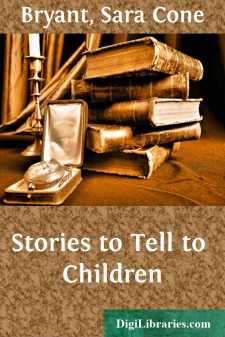Categories
- Antiques & Collectibles 13
- Architecture 36
- Art 48
- Bibles 22
- Biography & Autobiography 813
- Body, Mind & Spirit 142
- Business & Economics 28
- Children's Books 17
- Children's Fiction 14
- Computers 4
- Cooking 94
- Crafts & Hobbies 4
- Drama 346
- Education 46
- Family & Relationships 57
- Fiction 11829
- Games 19
- Gardening 17
- Health & Fitness 34
- History 1377
- House & Home 1
- Humor 147
- Juvenile Fiction 1873
- Juvenile Nonfiction 202
- Language Arts & Disciplines 88
- Law 16
- Literary Collections 686
- Literary Criticism 179
- Mathematics 13
- Medical 41
- Music 40
- Nature 179
- Non-Classifiable 1768
- Performing Arts 7
- Periodicals 1453
- Philosophy 64
- Photography 2
- Poetry 896
- Political Science 203
- Psychology 42
- Reference 154
- Religion 513
- Science 126
- Self-Help 84
- Social Science 81
- Sports & Recreation 34
- Study Aids 3
- Technology & Engineering 59
- Transportation 23
- Travel 463
- True Crime 29
How to Tell Stories to Children, And Some Stories to Tell
by: Sara Cone Bryant
Categories:
Description:
Excerpt
Not long ago, I chanced to open a magazine at a story of Italian life which dealt with a curious popular custom. It told of the love of the people for the performances of a strangely clad, periodically appearing old man who was a professional story-teller. This old man repeated whole cycles of myth and serials of popular history, holding his audience-chamber in whatever corner of the open court or square he happened upon, and always surrounded by an eager crowd of listeners. So great was the respect in which the story-teller was held, that any interruption was likely to be resented with violence.
As I read of the absorbed silence and the changing expressions of the crowd about the old man, I was suddenly reminded of a company of people I had recently seen. They were gathered in one of the parlours of a women's college, and their serious young faces had, habitually, none of the childlike responsiveness of the Italian populace; they were suggestive, rather, of a daily experience which precluded over-much surprise or curiosity about anything. In the midst of the group stood a frail-looking woman with bright eyes. She was telling a story, a children's story, about a good and a bad little mouse.
She had been asked to do that thing, for a purpose, and she did it, therefore. But it was easy to see from the expressions of the listeners how trivial a thing it seemed to them.
That was at first. But presently the room grew quieter; and yet quieter. The faces relaxed into amused smiles, sobered in unconscious sympathy, finally broke in ripples of mirth. The story-teller had come to her own.
The memory of the college girls listening to the mouse-story brought other memories with it. Many a swift composite view of faces passed before my mental vision, faces with the child's look on them, yet not the faces of children. And of the occasions to which the faces belonged, those were most vivid which were earliest in my experience. For it was those early experiences which first made me realise the modern possibilities of the old, old art of telling stories.
It had become a part of my work, some years ago, to give English lectures on German literature. Many of the members of my class were unable to read in the original the works with which I dealt, and as these were modern works it was rarely possible to obtain translations. For this reason, I gradually formed the habit of telling the story of the drama or novel in question before passing to a detailed consideration of it. I enjoyed this part of the lesson exceedingly, but it was some time before I realised how much the larger part of the lesson it had become to the class. They used—and they were mature women—to wait for the story as if it were a sugarplum and they, children; and to grieve openly if it were omitted. Substitution of reading from a translation was greeted with precisely the same abatement of eagerness that a child shows when he has asked you to tell a story, and you offer, instead, to "read one from the pretty book." And so general and constant were the tokens of enjoyment that there could ultimately be no doubt of the power which the mere story-telling exerted.
The attitude of the grown-up listeners did but illustrate the general difference between the effect of telling a story and of reading one. Everyone who knows children well has felt the difference. With few exceptions, children listen twice as eagerly to a story told as to one read, and even a "recitation" or a so-called "reading" has not the charm for them that the person wields who can "tell a story." And there are sound reasons for their preference....




